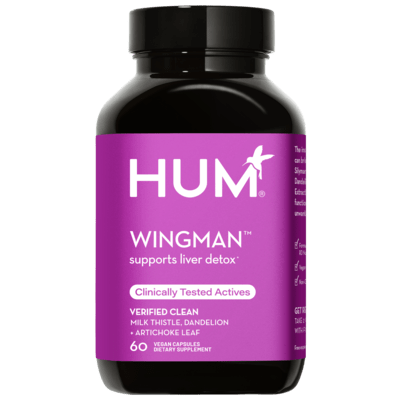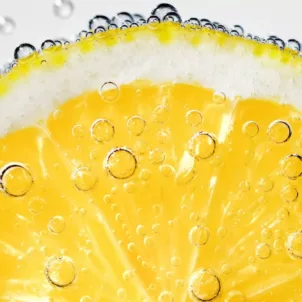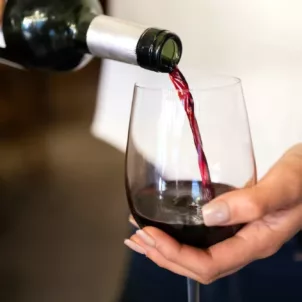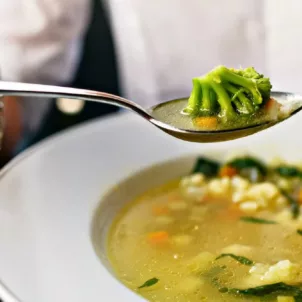THE WELLNEST • Food • Healthy Eating
Are Hard Seltzers Actually As Healthy As They Seem?
By Michele Ross •
August 23, 2021
Are hard seltzers bad for you or are they actually somewhat healthy? We asked two registered dietitians for their expert takes.
Move over, wine, beer, and spirits: Consumers are continually unwinding with a newer, fresher form of alcohol that has great PR to boot.
According to an industry report by Grand View Research, the hard seltzer market is expected to grow at a compound annual growth rate of 16.2 percent through 2027. Hoping to capitalize on this trend, beverage industry titans and emerging brands alike are gearing up to give White Claw and Truly a run for their money.
One of the biggest selling points of these boozy beverages is their lean nutritional profile. But are they as healthy as marketers claim, or are hard seltzers bad for you?
Below, two dietitians share everything you need to know about hard seltzer’s nutrition content (or lack thereof).


What is hard seltzer?
Also known as alcoholic seltzer and spiked seltzer, hard seltzer contains carbonated water, alcohol, and fruit flavors. The alcohol content derives from either:- fermented cane sugar
- malted barley or fermented gluten-free grains
Nutritional Features
Hard seltzer is often touted as a healthy form of alcohol. “Some hard seltzer brands even have people drinking their product in workout clothes,” notes Amy Shapiro MS, RD, CDN, the founder and director of Real Nutrition in NYC. Most spiked seltzers are gluten-free (excluding those with malted barley), she points out. For this reason, they’re attractive to people who have a gluten intolerance or sensitivity. “I understand consumers seeking out hard seltzer, as it’s marketed as low in sugar and carbs,” adds Lauren Slayton, MS, RD, the founder of Foodtrainers in NYC. However, these features don’t necessarily make these drinks compatible with a healthy lifestyle. After all, it’s still alcohol.Hard Seltzer Alcohol Content
Alcohol’s potency is measured by alcohol by volume (ABV). “Most beers hover around five percent ABV, wine 12 percent, and spirits 40 percent,” Slayton shares. Yet when it comes to hard seltzer, she says that ABV varies by brand, making it more difficult to generalize their alcohol content. “Some are as low as four percent, while some of the newer ones can be 12 percent or higher.” The strength of alcoholic drinks and how much you consume will naturally influence how healthful your intake is.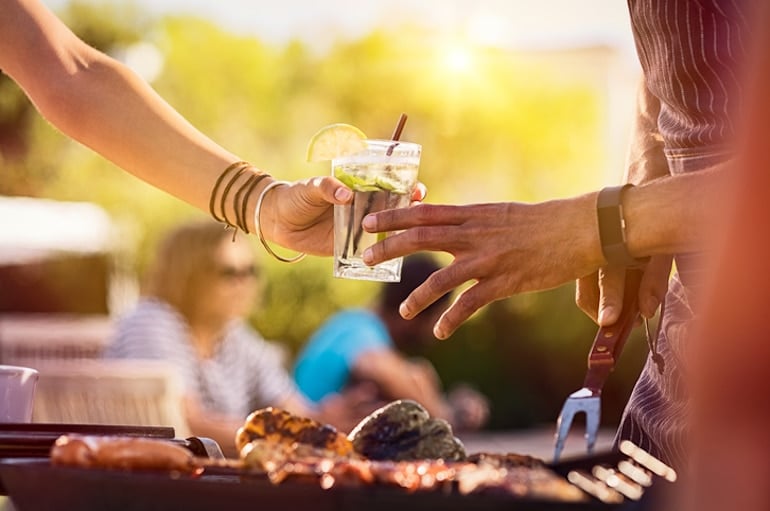
Is hard seltzer healthier than other types of alcohol?
Curious how your Claws and other canned faves stack up against other types of alcohol? As a reminder, here’s a quick reference to the standard serving size of each:- hard seltzer = 12 ounces (one can)
- wine = five ounces
- beer = 12 ounces (one can)
- spirits = 1.5 ounces (one shot)
Hard Seltzer vs. Wine
Shapiro says that hard seltzers are often lower than sugar than many wines. She also reiterates that they tend to be lower in ABV, “usually about four to six percent,” excluding the outliers on the higher end. That said, Slayton mentions a caveat on the sugar front that wine drinkers may appreciate. “White Claw has less than two grams of sugar, and Truly has slightly less,” she begins. “But what most people don’t realize is that a dry wine—take pinot grigio for example—has around the same amount.”Hard Seltzer vs. Beer
On the same note about sugar content, Slayton calls out the fact that beer typically contains no sugar at all. (That is unless you opt for sour beers and other fruity varieties with added sugar for flavor.) However, “beer is higher in carbs at 13 grams per can,” she adds. So if you’re trying to watch your carb intake (or you follow a low-carb diet plan such as keto), hard seltzer may be the better choice.Hard Seltzer vs. Spirits
Slayton shares that, similar to most beers, most spirits contain zero grams of sugar—unless they too contain added sugar to make a flavored liquor. Plus, when you’re drinking liquor, you may end up having it with a mixer that may contain sugar. As for carbs? “Sure, a White Claw is low-carb at two grams per can, but a shot of tequila has zero grams of carbs,” she mentions. “Suddenly hard seltzers don’t seem as special!”Is hard seltzer hydrating?
Since non-alcoholic carbonated water can contribute to your daily hydration intake, might the same go for its boozy counterpart? Unfortunately, Shapiro answers this question with a hard no. “Alcohol isn’t good for you no matter what, since it’s considered a toxin to the body,” she shares. “It also dehydrates you.” For this reason, she recommends drinking a glass of water following each serving of alcohol, as well as “a large glass before bed if you’ve had a few drinks that day.”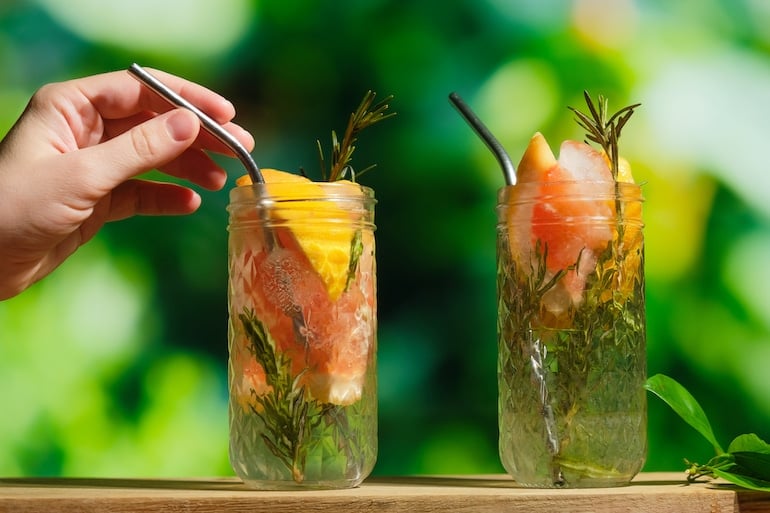
How to Choose the Healthiest Hard Seltzer
Both dietitians recommend taking a thorough look at labels and going beyond marketing claims to find the best hard seltzer that won’t compromise your health goals. Here are some of their top tips:- Be a conscious consumer. Shapiro notes that many brands like to “act clean” by using various terms may mask the use of artificial sweeteners and other not-so-healthy additives. Learning how to navigate labels will help you in your quest to find the healthiest hard seltzer and can empower you on other hauls as well.
- Look for the good stuff. “I’d say that ‘organic’ or ‘no sugar added’ would be your best bets for call-out words,” Shapiro continues. Piggybacking off the tip above, you may also want to check that your spiked seltzer of choice clearly calls out that it’s free of artificial sweeteners and flavors. Slayton adds that the healthiest hard seltzers will contain real fruit in some form, which shouldn’t be too sweet or pack excess carbs.
- Be mindful of BPA exposure. Hard seltzers often come in aluminum cans, which Slayton says may be lined with BPAs. “BPAs are endocrine disruptors, and alcohol can make leaching of these chemicals more likely,” she warns. While only an estimated 10 percent of canned goods still contain this chemical, they remain a primary source of BPA exposure. If you’re concerned about potential adverse effects, you may want to reach out to hard seltzer brands directly to ask about their packaging or switch to beverages in glass bottles instead.
The Bottom Line
So is there a clear answer to the question if hard seltzers are bad for you? Can they fit into a healthy diet? “I wouldn’t take a hard line on hard seltzers,” Slayton concludes. “They’re a decent choice compared to other forms of alcohol—but they’re far from health foods, despite the marketing. And while we can split hairs comparing spirits and beer to hard seltzer, your best bet is to monitor the number of drinks you’re having.” This point will benefit your overall health, as well as specific wellness goals. For instance, if weight management is a concern, she suggests limiting your alcohol intake (four drinks a week for women, seven drinks a week for men) to notice positive results. “Calories from alcohol don’t provide any nutrition, so they’re empty,” Shapiro adds, which also requires consideration for your overall nutrition plan. On a final note, both RDs say that if you don’t typically drink alcohol, the supposed wellness appeal of hard seltzers shouldn’t make you start.More like this
